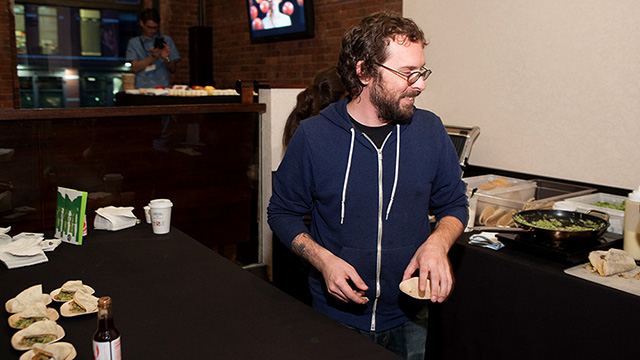From Thomas Björkman:
Hundreds of Cornell alumni gathered at the Astor Center in Greenwich Village for Furrows to Boroughs: A Taste of New York State in New York City, a regional sesquicentennial celebration October 22 hosted by the College of Agriculture and Life Sciences. The event highlighted the link between tri-state agriculture and Cornell. The culinary work and products of local farmers, agricultural businesses and chefs were on display and available to taste.
Horticultural products featured prominently. Many wines of course, a tremendous pastry designed around Susan Brown’s new SnapDragon apple, and fall berries and vegetables raised with techniques and varieties developed at Cornell. The alumni were not only excited by the great food, but also proud to be part of the institution that helps make it all possible.
I collaborated with chef and native Ithacan Tyler Kord, who has been making a big splash in the New York City restaurant scene by highlighting broccoli in new contexts. He operates the No. 7 restaurant in Fort Greene Brooklyn and has two high-profile sub shops at the Plaza Hotel by Central Park and the Ace Hotel in the financial district where he has popularized both the broccoli sub sandwich and the broccoli taco. This year Short Stack published his cookbook Broccoli.
At Furrows to Boroughs, Tyler served tacos using broccoli provided by Windflower Farm, operated by former Cornell Cooperative Extension educator Ted Blomgren, who continues to be an avid cooperator on Cornell Horticulture research and extension projects as well as a pioneer for providing fresh produce to the food deserts in the outer boroughs through an active CSA.
As part of the Eastern Broccoli Project, I’m leading a team to develop varieties as well as the production and marketing infrastructure to supply New York City with Northeast broccoli for three months of the year, and have other Eastern regions supply the same buyers for the balance of the year.
Our goal is not to supply all of the Big Apple’s broccoli, but enough to provide regional growers with a profitable alternative enterprise and consumers with a fresher, more flavorful and nutritious product.
The project is funded by the USDA’s Specialty Crop Research Initiative, and is a collaboration with six other universities, the Agricultural Research Service, seed companies, distributors and growers.



